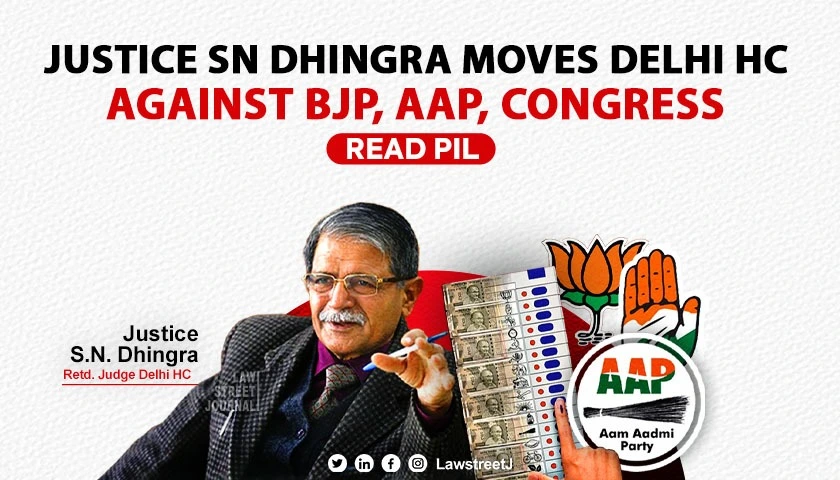New Delhi: Justice (Retd.) S.N. Dhingra, former judge of the Delhi High Court, has filed a Public Interest Litigation (PIL) before the Delhi High Court, alleging corrupt electoral practices by multiple political parties in the run-up to the 2025 Delhi Assembly elections. The petition seeks the court’s urgent intervention to investigate and put an end to alleged unlawful activities undertaken by the Bharatiya Janata Party (BJP), Aam Aadmi Party (AAP), and Congress. According to the petition, these actions not only violate electoral laws but also infringe upon fundamental voter rights, including the right to privacy under Article 21 of the Indian Constitution. The petitioner contends that such practices severely undermine the free and fair conduct of elections, a cornerstone of Indian democracy.
One of the primary concerns raised in the petition pertains to the “Mukhyamantri Mahila Samman Yojana”, announced by AAP, which is allegedly being misrepresented as a Delhi government initiative. The petitioner claims that AAP is promising ₹2,100 per month to female voters post-elections in exchange for their votes, which constitutes bribery disguised as an electoral promise. Similarly, BJP and Congress have reportedly launched their own schemes—“Mahila Samridhi Yojana” and “Pyari Didi Yojana”—offering direct cash benefits of ₹2,500 per month to female voters if elected. The petitioner argues that such schemes violate provisions of the Representation of the People Act, 1951, particularly Section 123(1), which pertains to corrupt practices, and Section 127A, which deals with unauthorized election materials. Additionally, these actions allegedly breach Sections 170 and 171 of the Bhartiya Nyaya Sanhita, 2023, which relate to bribery and undue influence in elections.
The petition highlights that these activities blatantly disregard advisory guidelines issued by the Election Commission of India (ECI) and calls for immediate cessation of such electoral malpractices. It further demands the protection of voter data from misuse, the initiation of legal proceedings against those responsible for the alleged offenses, and the implementation of monitoring mechanisms to ensure that the upcoming elections in Delhi are conducted in a free and fair manner.
In a significant constitutional argument, the petitioner asserts that political parties in India should be classified as “State” under Article 12 of the Constitution, given their crucial role in shaping governance and public policies. The petition contends that political parties act as intermediaries linking social forces to governmental institutions, thereby performing public functions that warrant judicial scrutiny and review. Even if they are not formally recognized as “State” entities, the petitioner argues, their activities should still be subject to judicial oversight to uphold electoral integrity.
The Delhi High Court’s decision in this matter could set a landmark precedent in regulating electoral practices, particularly concerning the intersection of privacy rights and election integrity in India. If accepted, the PIL could reshape how political parties engage with voters and ensure stricter compliance with electoral laws.
Counsel for the Petitioner Justice (Retd.) SN Dhingra: Adv Harshvardhan Sharma and Adv Siddhartha Borgohain.


![Delhi High Court Sets Aside Arbitral Tribunal's Award Against NHAI in Highway Project Delay Case [Read Judgment]](/secure/uploads/2023/07/lj_9605_23374c2e-392c-4491-a2fe-f2f12fc5272f.jpg)
![Delhi Court Rejects Stay Request in Defamation Case Against Rajasthan CM Ashok Gehlot [Read Order]](/secure/uploads/2023/08/lj_5208_80de1ddc-d76a-4f7f-b180-408e3ae14fb4.jpg)





